Oil Minister Says World, Europe Need Iran's Oil And Gas
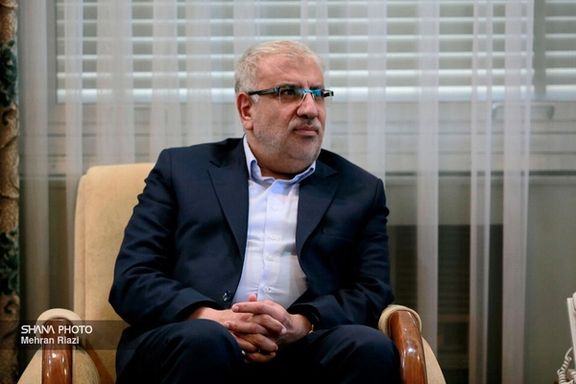
World markets need Iran’s oil and gas supplies this winter, oil minister Javad Owji said Thursday, as diplomats gathered in Vienna for talks on Tehran’s nuclear program.

World markets need Iran’s oil and gas supplies this winter, oil minister Javad Owji said Thursday, as diplomats gathered in Vienna for talks on Tehran’s nuclear program.
The government news website IRNA reported that on the sidelines of an OPEC+ meeting, Owji said, “This winter is very important for Europe and the world” and they should make plans.
The United States imposed third-party sanctions on Iranian oil exports in 2018 after former President Donald Trump withdrew from the 2015 nuclear deal known as the JCPOA and launched a ‘maximum pressure’ campaign. Talks since April 2021 to revive the agreement have remained unsuccessful.
Iran’s oil exports dropped to under 300,000 barrels per day in 2019 because of the sanctions, but after nuclear talks started, it increased shipment to as high as one million bpd. Tehran has the capacity to sell more than 2 million bpd if a nuclear deal is achieved and US sanctions lifted.
But Iran cannot contribute much to the natural gas market although it has the second largest reserves in the world. Lack of technology investments has seen production falling, while its domestic consumption has risen. If most sanctions are lifted and Iran is able to find Western partners it can increase production in the future.
Owji said that the return of Iran’s oil to world markets is important and reiterated Iran’s position against energy sanctions. However, Iran has expanded its nuclear program and says it has the capability to produce weapons.
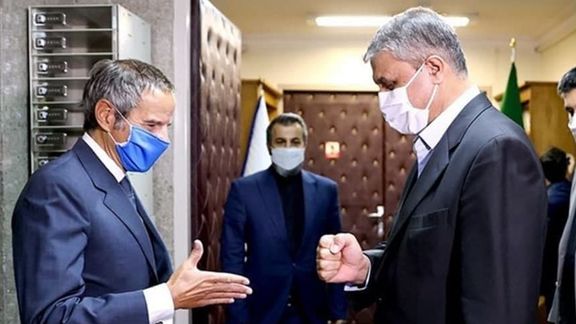
Tehran will not “shy away from any action aimed at removing sanctions” and has “no reason” to abide by the 2015 nuclear deal, its atomic chief said Wednesday.
Mohammad Eslami, head of the Atomic Energy Organization of Iran, told a cabinet meeting that June’s removal of some cameras of the International Atomic Energy Agency was in line with the parliament decision, taken in December 2020 , to reduce agency monitoring to that required by the Nuclear Non-Proliferation Treaty (NPT) rather than the extensive monitoring required under the 2015 nuclear deal, the JCPOA (Joint Comprehensive Plan of Action).
“When the other side is not in JCPOA, we have no reason to abide by a quasi-obsolete commitment,” Eslami said. “The cameras will not go back until they return to JCPOA and stop making false accusations.”
The United States – which left the JCPOA in 2018, imposing ‘maximum pressure’ sanctions – and three European states successfully moved a resolution at the IAEA board in June censuring Iran over what the agency regards as unsatisfactory explanations of pre-2003 nuclear work.
Eslami stressed that following legislation passed in December 2020, Iran had begun using “advanced centrifuges,” devices used for uranium enrichment barred under the JCPOA. “We will not shy away from any action aimed at removing sanctions,” Eslami said.
Agency informed on nuclear expansion
During a press briefing in New York Tuesday evening, Rafael Mariano Grossi, the IAEA director-general, was asked by Iran International’s Maryam Rahmati about Eslami’s statement earlier Tuesday that Iran was preparing new centrifuges, including relatively advanced IR-6s.
Grossi confirmed Iran had briefed the IAEA. “Our inspectors are mobilized and they are going to be looking into this when this happens,” he said. “Not all of them have been prepared – just part of them – and we are going to be informing the Board of Governors soon about this.”
Grossi reiterated that the agency’s “visibility” had been “significantly reduced” by Iran’s decision in June to remove 27 cameras in “certain facilities.” He expressed particular concern over the agency’s lack of knowledge of Iran’s manufacturing activities – where access is not required under the JCPOA. “We will have to come to terms with Iran to account for them when, if and when, they agree on reviving the JCPOA,” Grossi said.
Knowledge of the amount and kinds of centrifuges manufactured, even if not in use, is seen by the agency as important part in assessing the nuclear program, particularly with Iran enriching to 60 percent, close to 90 percent ‘weapons grade’ and far above the 3.67 percent JCPOA limit.
IRGC designation
In Washington Tuesday, John Kirby, the National Security Council Coordinator for Strategic Communications, in a press briefing largely about the US drone strike killing Ayman al-Zawahiri, the al-Qaeda leader, in Afghanistan, reiterated President Joe Biden’s commitment not to lift the US Foreign Terrorist Organization’ (FTO) designation of Iran’s Revolutionary Guards (IRGC) as part of negotiations to restore the JCPOA.
Eslami said at the cabinet meeting that the designation had “not been the main issue in the talks.” Disagreements between Iran and the US over JCPOA restoration – both in year-long talks in Vienna paused in March, and in the June round in Qatar – have centered on which US sanctions violate the 2015 agreement. Tehran argues that the administration of President Donald Trump introduced sanctions under various rubrics, including the IRGC designation. as part of its ‘maximum pressure.’
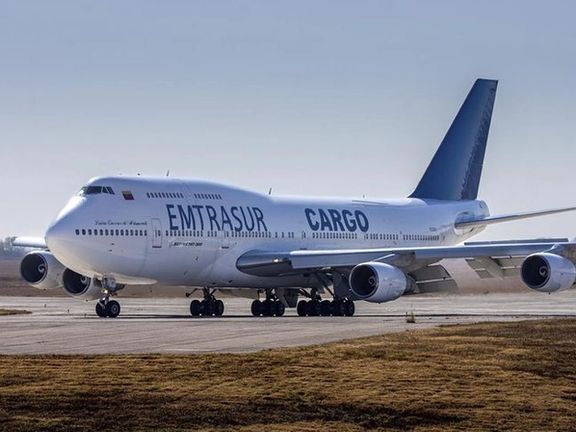
The United States Tuesday asked permission to confiscate an Iranian plane impounded in Argentina on suspicions of links to international terrorist groups.
Argentina grounded the 747 cargo plane after its unannounced arrival from Mexico to an airport in Buenos Aires on June 8. The plane originally belonged to Iran’s Mahan airline affiliated with Iran’s Revolutionary Guard (IRGC) and sanctioned by the US for transporting arms to Syria and supporting terrorism.
The plane had arrived in Argentina with a crew of 19 people, including five Iranians, some with clear ties to the IRGC. Argentina confiscated their passports. In recent days, a judge ordered the release of 12 crew members after weeks of being denied permission to leave Argentina.
In June, Gerardo Milman, an Argentine lawmaker, told Iran International that Iranians aboard the Venezuelan plane planned “attacks on human targets.” Contrary to Iran’s claim June 13 that the plane was not owned by an Iranian company, Milman said the pilot was “a senior official of Qods (Quds) force,” Tehran’s extraterritorial intelligence and secret ops outfit listed as a terrorist organization by the United States.
Early in 2022, a Venezuelan government company decided to set up a cargo division that came to be called Emtrasur Cargo and its first plane was the Boeing 747-300M bought or leased from Mahan airlines and christened ‘Louisa Caceres Arismendi.’
The grounding of the 747 sparked weeks of intrigue as well as concern within the Argentine government over its ties to Iran and Venezuela and companies sanctioned by the US.

The confiscation request by the US Department of Justice followed the unsealing of a July 19 warrant for the plane's seizure in the US District Court for the District of Columbia, which alleged that the aircraft could be confiscated because it violated export control laws, the DOJ said.
The DOJ said the US-origin Boeing 747-300 aircraft is subject to sanctions as its sale from Iran's Mahan Air to Emtrasur last year, part of the Venezuelan Consortium of Aeronautical Industries and Air Services (Conviasa), violates U.S. export laws. Both companies are sanctioned by the United States for alleged collaboration with terrorist organizations.
"The Department of Justice will not tolerate transactions that violate our sanctions and export laws," said Assistant Attorney General Matthew Olsen of the DOJ's National Security Division in the statement.
The US move comes amid stalled talks to revive the 2915 Iran nuclear agreement, JCPOA. Apparently, after 16 months of indirect talks between Iran and the US, Tehran insists that the IRGC should be removed from the US list of Foreign Terrorist Organizations (FTO).
One intriguing part of the nearly two-month-long saga was the identity of the plane’s Iranian pilot. Shortly after the plane was impounded it became clear that the pilot was Gholamreza Ghasemi, a known IRGC Qods Force operative and reportedly a relative of Iran’s current interior minister Ahmad Vahidi. The other Iranians were also linked to IRGC or its terror-linked companies.
Mahan Air is sanctioned for ties to the Islamic Revolutionary Guard Corps-Quds Force (IRGC-QF), a US-designated terrorist organization. The US sanctioned Conviasa in 2019 for its ties to Venezuelan President Nicolas Maduro's government.
"The seizure of this aircraft demonstrates our determination to hold accountable those who seek to violate US sanctions and export control laws," said U.S. Attorney Matthew Graves.
Fourteen Venezuelans and five Iranians were traveling on the plane when it arrived in Buenos Aires. Seven of them are still detained in Argentina.
Argentina's Foreign Ministry did not immediately respond to a request for comment.
With reporting by Reuters
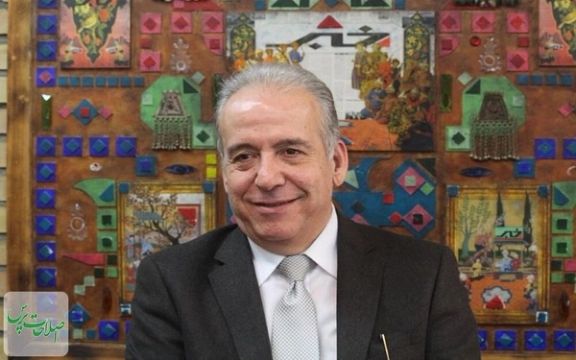
Iran can double its trade with China if US sanctions are lifted, but it would need 8 years to regain the economic status of 2010, a Tehran business leader says.
China has been Iran’s top trading partner in recent years and has helped with its overt and covert oil purchases since 2018 when the United States withdrew from nuclear deal known as JCPOA and imposed crippling sanctions on Iran.
The head of Iran-China chamber of commerce in Tehran, Majidreza Hariri told the Iranian Student News Agency (ISNA) in an interview that although China has taken a public stance against US sanctions, “but economic relations have their own characteristics and Iran should have its own special plans for neutralizing sanctions.”
Hariri in the past one year has repeatedly hinted at the economic benefits of lifting US sanctions, without commenting directly on the nuclear talks that have dragged on for 16 months without a result, keeping sanctions on Iran’s oil exports and international banking.
In April, the business leader said that if US sanctions are lifted, annual trade with China could top $60 billion. Last November he warned that Iran’s economy was at a dangerous juncture, with high inflation and a host of other problems. Since then, the national currency has lost more value and inflation has climbed to an annual rate of 54 percent.
Hariri also said that Iran would need eight years once sanctions are lifted to regain the same economic footing it had in 2010, when first international sanctions were imposed for its nuclear program.
Hariri told ISNA, “Despite many slogans, the economy was never a priority for Iran’s economic decision makers, and this has made current conditions so difficult.” He pointed out that while Iran’s oil and petrochemical products in the past had a strong market in China, now it has lost its position to others.
As an example of how sanctions impact ties with China, Hariri said that when a large Chinese operator of ports has 18 ventures in different countries, it cannot risk being targeted by secondary US sanctions. Nevertheless, he added, “China has shown cooperation with Iran for many years.”
Asked if a nuclear agreement is the only salvation for the economy, the businessman said that any agreement needs a 50-50 compromise and talks should continue to fruition, however Iranian officials in charge of the economy should also pursue other avenues to “neutralize sanctions,” to be able to emerge from the current “deadlock”.
Officials, particularly the followers of Supreme Leader Ali Khamenei’s hardline policies, who are currently in charge, often speak of “defeating sanctions” but in essence their efforts have marginal results. Most countries and international corporation shun business with Iran, which for more than a decade has attracted little foreign investment or large joint projects.
Russia on paper has promised many investments, or Iranian officials have claimed, but nothing significant has materialized. Recently, Moscow’s ambassador in Tehran complained that Iran owes Russia more than $700 million.
Iran last year signed a 25-year “strategic cooperation” agreement with China, which includes no specific provision for projects or investments. Officials in Tehran have said that the document is a framework based on which specific deals can be reached, but so far there is no sign of any large Chinese investments that Iran needs.
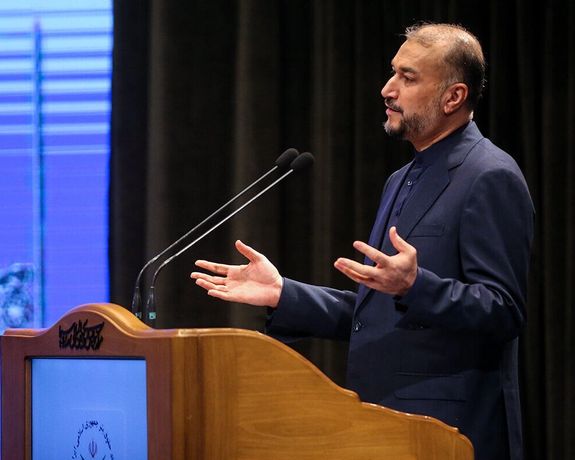
Iran’s foreign minister says Tehran’s move to feed fuel into “hundreds” more centrifuges to enrich uranium was a response to new US sanctions on entities supporting oil and petrochemical trade.
Hossein Amir-Abdollahian said on Tuesday that “In response to the new US sanctions, we started pumping gas into hundreds of new generation centrifuges. We acted based on the decision made. The Americans shouldn’t think they can get concessions from Iran at the negotiating table with these measures.”
He described it as startling that the US proposed a resolution in the International Atomic Energy Agency while “we repeatedly received goodwill messages from US President Joe Biden through mediators.”
On Monday, August 1, the US Treasury sanctioned several companies it said were involved in the sale of Iranian petroleum and petrochemicals.
Announcing Tehran’s latest steps beyond the limits of the 2015 Iran nuclear deal, the JCPOA (Joint Comprehensive Plan of Action), Behrouz Kamalvandi, spokesman for the Atomic Energy Organization of Iran, said on Monday that Iran has started pumping uranium gas into hundreds of IR-1s & IR-6 centrifuges as part of its plan to reach uranium enrichment capacity of at least 190,000 SWU (separative work units), a measurement of efficiency in enrichment. Under the JCPOA Iran was allowed only 6,104 SWU and no IR-6s.
Amir-Abdollahian added that Tehran is reviewing the recent proposals by the European Union to take forward talks over renewing the 2015 Iran nuclear deal. The US State Department spokesman has said Washington also is reviewing proposals made by Joseph Borrell, the European Union foreign policy chief.
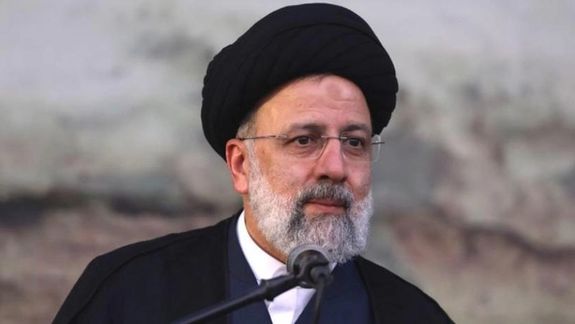
Iranian President Ebrahim Raisi is slated to travel to New York for the 77th session of the UN General Assembly in September, his first since he did not attend the event last year.
In his weekly press conference on Tuesday, Iranian government spokesman Ali Bahadori Jahromi said that preliminary plans have been made for Raisi’s participation in the United Nations annual gathering.
The UNGA 77 is scheduled to open on September 13 in New York, and the first day of the high-level General Debate will be on 20 September. On the agenda of this year’s event are a meeting to mark the commemoration of the 30th anniversary of the adoption of the Declaration on the Rights of Persons Belonging to National or Ethnic, Religious and Linguistic Minorities on September 21 and a plenary meeting to commemorate the International Day for the Total Elimination of Nuclear Weapons on September 26.
Raisi – who is on the US and European sanctions list -- did not attend the high-level summit in the previous year, and only delivered a video speech.
He is probably among the most controversial among the Islamic Republic presidents to attend the General Assembly as he was a member of a "death committee" that issued orders to kill political prisoners in 1988. A witness in the Swedish trial of Hamid Noury (Nouri), an ex-judicial official and jailor, over alleged involvement in Iran’s 1988 prison executions named Raisi as one of the officials directly involved in the massacre.
Earlier in the year, prominent former UN officials called for a UN investigation into the 1988 "massacre" of political prisoners in Iran, including Raisi’s role, at that time.